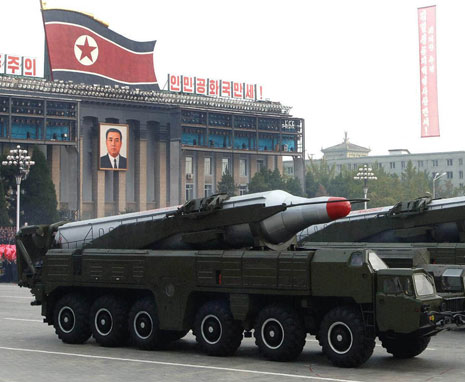Morning Bell: North Korea on the Edge
Amy Payne /
Yesterday, North Korean officials warned foreigners in South Korea to leave that country. Today, the foreign ministers of the Group of Eight (G8) countries—the United States, Britain, Russia, Japan, Canada, France, Germany, and Italy—are meeting in London to discuss North Korea’s threats.
Americans are taking notice. CNN reports that “more than four in 10” Americans in a new poll say “they see the reclusive nation as an immediate threat to the United States…That’s up 13 percentage points in less than a month.”
Heritage’s experts have been following the threats closely—in fact, senior research fellow Bruce Klingner, formerly the CIA branch chief for Korea, warned of the growing risk of a clash in late March.
>>> VIDEO: Watch North Korea experts explain where these threats are coming from
Klingner says in his latest paper this week that the escalating threats are new and “more dangerous”:
Perhaps most worrisome is that the regime’s threat du jour is occurring so rapidly. In the past, Pyongyang would issue a threat and then allow Washington and its allies time to respond, preferably by offering benefits to buy its way back to the status quo ante. The current rapid-fire threats conflict with previous North Korean behavior and reduce the potential for de-escalating the crisis.
A few things to note:
North Korea is capable of firing missiles.
Heritage’s Michaela Dodge warns that “North Korea can already hit Hawaii, parts of Alaska, and California. It can also hit U.S. forward-deployed troops in South Korea, Japan, and Guam…While the Obama Administration does not believe that North Korea is capable of hitting the U.S. with a nuclear weapon, the U.S. has a history of underestimating North Korea’s ballistic missile and nuclear weapons programs.”
The U.S. has already responded to the threats—but more commitment to missile defense is needed.
The United States has sent nuclear-capable B-2 and B-52 bombers, F-22 fighters, and Aegis destroyers to South Korea. The Obama Administration reversed just a few of its harmful cuts to missile defense, now that the President realizes those defenses might be needed. But at the same time, the Administration has cut half a billion dollars from missile defense. This is the wrong direction to take.
Diplomacy doesn’t work with Kim Jong-un.
Klingner recommends tough sanctions against North Korea and others violating U.N. resolutions. The U.S. should “resist the siren song” of engaging North Korea in talks, while backing up our allies with a sustained show of force.
We can’t afford to be wrong. As Klingner says:
North Korea is easy to ridicule…Its leader could well play the villain in a James Bond or Austin Powers movie. Self-appointed ambassador Dennis Rodman’s visit affirmed the image of the reclusive regime as the ultimate reality show. As such, the tendency has been to dismiss all North Korean threats as bluster. That would be a mistake.
Read the Morning Bell and more en español every day at Heritage Libertad.
Quick Hits:
- The Senate may vote to consider Harry Reid’s gun control legislation tomorrow.
- Iranian President Mahmoud Ahmadinejad says his country has “gone nuclear,” reports the International Business Times.
- President Obama’s nominee for Energy Secretary backs increased use of natural gas.
- MSNBC’s latest promo about children has Americans outraged. Find out why.
- Heritage President Jim DeMint shared his thoughts on immigration reform at the Bloggers Briefing yesterday.

